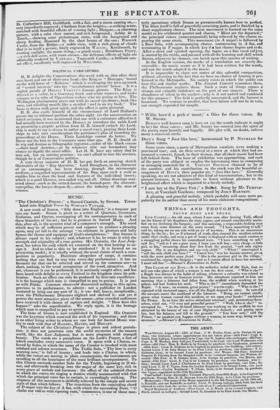MUSIC.
"The Christian's Prayer ;" a Sacred Cantata, by SPOHR. Trans- lated into English VPI.RP by V.riw Ann TAYLOR.
A new work of SPOHR; "fitly done into English," is a treasure put into our hands. SPOIIR is great as a writer of Quartets, Overtures, Sinfonias, and Operas, overtopping all his contemporaries in each of these branches of his art ; but be is greatest in Sacred Music. And this, after all, is the severest trial of a composer's strength. The mind which may be of sufficient power and expanse to produce a pleasing opera, may yet fail in the attempt "to celebrate in glorious and lofty .hymns the throne and equipage of God's almightiness." But SPOHR is always equal to his subject ; and, whatever it be, he treats it with the strength and originality of a true genius. His Oratorio, the Last Judg- ment, has taken the rank which we ventured on the first hearing to as- sign it. And to what is this to be attributed ? It is formed on no preexisting model ; it is wholly without the usual claims of such a com- position to popularity. Destitute altogether of songs, it contains nothing that can find its way into every-day performance : it has no favourite bit that can be selected and served tip for common use—in short, nothing, in the usual acceptation of the word, attractive. And yet, whenever it can be performed, 'it is anxiously sought after, and has been heard with delight at every Festival in the kingdom since its pub- lication. Such an effect can only be produced by first-rate excellence : it is the homage which man is compelled to pay to genius. It is just so with Fidelio. Common observers' discovered nothing in this opera, previous to its performance, to admire : not a publisher in London ventured to bring out any part of it ; it was dull, heavy, inexplicable ; even the Philharmonic Directors slighted and shelved it : and yet it proves the most attractive piece of the season—nine crowded audiences have received it with shouts of rapture and delight. "How does this happen?" asks the superficialist. We reply again, it is the homage which man is compelled to pay to genius. The fame of SPOHR is now established in England. His Oratorio was the keystone which crowned the arch of his reputation; and there is no other living writer to whom we can look for Sacred Music wor- thy to rank with that Of HANDEL, HAYDN, and MOZART. The subject of the Christian's Prayer is pious and ardent gratula- tion: it does not penetrate into the awful mysteries of the unseen world, like the Last Judgment, but is more pregnant with tranquil beauty. . The words are a paraphrase on the Lord's Prayer, a line of which concludes every successive verse. It opens with a Chorus, re- lieved by Solos, in which the name Of the Creator is invoked with most subdued and solemn reverence. The Treble Solo, "Thy love is every morning new," is full of beauty; and leads into a Chorus, in which, while the voices are moving in plain counterpoint, the instruments are revelling in all the luxuriance a the moit brilliant accompaniment. To this Chorus succeeds another Solo for the Treble, beginning in D mi- nor, and afterwards breaking into the major of the same key, rich in every grace of melody and harmony: the effect of the subdued chorus in which the voices are singing a mOtivo wholly unconnected with that Which the principal voice has to sustain, is exceedingly. striking. The elegance of this movement is Skilfully relieved by the simple and severe style, of that which follows.- -The transition from the concluding chord of D major into the key of A flat, with which the Succeeding Duet, "0 clothe our vall:es with ripening corn," COnimences,"is'one'of those mas- terly operations which SPOHR so preeminently .knows bow to perfect. The Duet itself is full of gracefully entwining parts, and is finished by a short supplicatory chorus. The next movement isformed.on the same model as his celebrated quartet and chorus, " Blest are the departed ;." the principal voices (unaccompanied) being relieved by the chorus re- peating the same strain. This movement (in A major) is followed by a Bass Solo, with accompanying chorus, commencing in A flat, and terminating in F major, in which key ti a last chorus begins and ends. After a short and spirited opening, the fugue, on a fine vocal sul ject, is started by the treble, and pursued with all the learning and skill which SPOIIR, whenever be chooses, can lavish upon this species of writing. t
In the English version, the marks of a translation are scarcely dis- coverable: the music seems as if it had been written for the words, and not the words adapted to the music.
It is impossible to close wir notice of this splendid composition, without adverting to the fact that we have no chance of hearing it per- formed in the Metropolis. No society exists in which the public can hear this and similar works. The Ancient Concert renounces them, the Philharmonic neglects them. Such a state of things argues a strange and culpable indolence on the part of our singers. There is abundance of talent in the market—why is it not united and combined for this purpose ? The field is perfectly unoccupied, and the harvest is luxuriant. We venture to predict, that here labour will not be in vain, nor strength expended for nought.


























 Previous page
Previous page